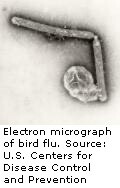
THURSDAY, Dec. 24 (HealthDay News) — Based on findings in animals, researchers are reporting that a new compound may be a better choice for treating bird flu — also known as avian influenza (H5N1) — than the antiviral Tamiflu.
“H5N1 virus is so pathogenic even Tamiflu doesn’t protect all the infected animals. This compound works much better, even three days after infection,” study senior author Yoshihiro Kawaoka, a University of Wisconsin-Madison virologist, said in a university news release.
The researchers tested the compound in mice and found that it was effective against H5N1, seasonal flu and the H1N1 virus. But tests in humans aren’t complete: the third phase of testing, in Japan, has yet to begin.
The compound, known as T-705, could give doctors a new weapon against strains of flu that are resistant to Tamiflu, the study authors noted.
The findings are published online in this week’s issue of the Proceedings of the National Academy of Sciences.
More information
The U.S. Centers for Disease Control and Prevention has more on avian flu.

